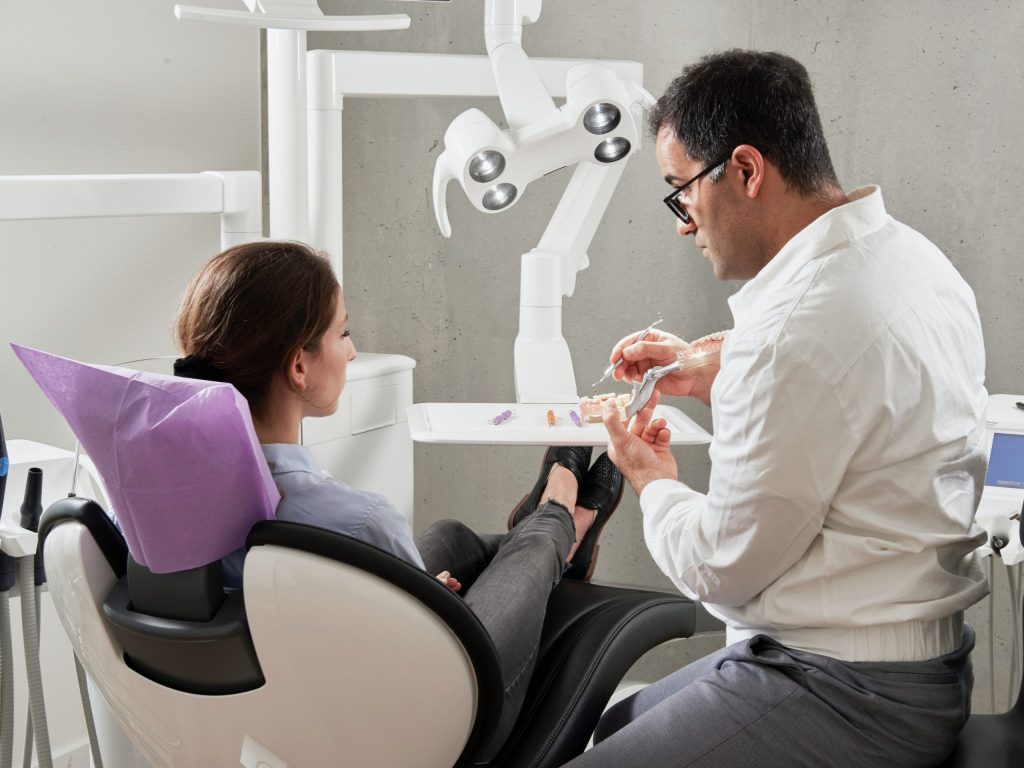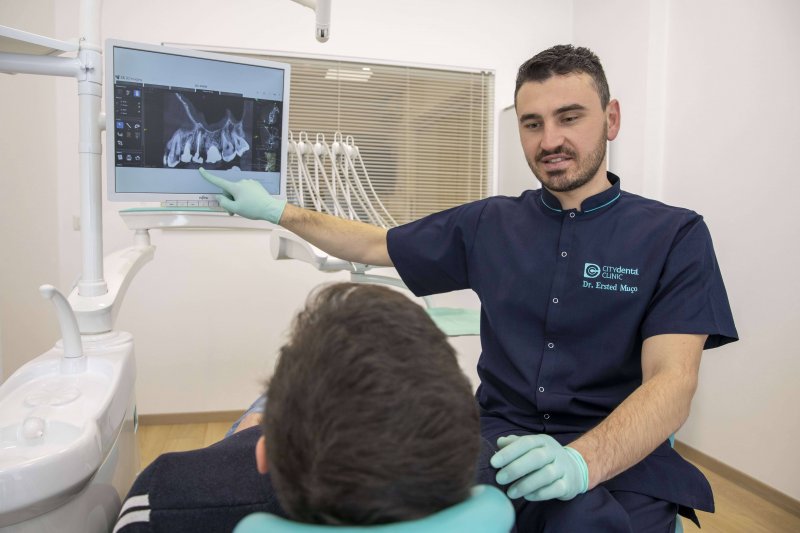If we take a look at the groups of professionals that make life in dental clinics, we could only think that all of them are dentists or hygienists. But this is the wrong view of dental clinics. In fact, in these facilities you can find a wide variety of specialists in the oral field that are segregated by the different branches of health that they practice and that make the care of a patient so complete.
Among the many specialties that we can find in a dentist, today we will take a look at stomatologists. This specialization is hidden from most patients’ eyes, and they may even think that it has nothing to do with oral health, but it is quite the opposite.
Are you curious? We are glad to know, because in this article we will guide you through stomatology and frequently asked questions around this profession that are immersed in our oral health.

● Oral rehabilitation
● Orthodontics, prosthodontics and dental prosthesis.
● Periodontics, endodontics and dental implantology.
● Pediatric dentistry and geriatric dentistry
● Esthetic dentistry
● Cariology, maxillofacial surgery or preventive dentistry
● Neurofocal dentistry
● Cariology and forensic dentistry
● Facial orthopedics, gnathology
● Maxillofacial prosthodontics
● Oral pathology
● Infant and prenatal dentistry
● Oral radiology
● Sports dentistry

This profession, besides fulfilling a specific role in general medicine, maintains some differences with its sisters: dentistry and maxillofacial surgery.
Among the most outstanding differences we can note that it is not the same title and there are different branches of study for this profession. Stomatologists receive the title of Licentiate in Medicine specialized in Stomatology. While the dentist is only licensed in dentistry, therefore it could be said through these data that a stomatologist is more qualified to provide general medical care than a dentist, and also has the joy of being able to practice without any problem the career of general medicine.
This disease is presented through blisters or small ulcers that may appear on the inner part of our cheek thanks to constant biting, this is very common in people with psychological conditions such as anxiety or OCD. Although they can also appear thanks to poor oral hygiene, internal burns, poorly placed dental implants and even a poorly organized diet. It is more common in older populations, between the age of 65 and older.
The solution to prevent this disease is to constantly brush our teeth properly and avoid damaging our mouth. Also, avoid foods that are too strong in taste, by this we mean citrus fruits or foods with high salt content. But in any case, it should be treated by a stomatologist in order to present the best treatment against the blisters.

This disease is not very well known in general, but it can affect a considerable part of the population. Its symptoms are constant burning in the inner part of the mouth accompanied by an uncomfortable numbness sensation, both intermittently and specifically when performing any type of movement. The most affected areas are usually the tongue or cheeks.
In half of the cases its origin is unknown, although the most frequent reasons for which this syndrome develops are: Inconveniences with maxillofacial mechanics, internal infection, food allergy, medical treatment prior to any extra disease, tobacco consumption and even stress situations and psychological conditions such as anxiety.
An accurate diagnosis is needed to be able to focus on solving the problem from the root, it is not an easy treatment because it requires great patience and to prove that it is what works for the patient. It can even be accompanied by psychological help in case it is due to a problem of stress or anxiety.
Although this can be seen as a common ailment, sometimes you have to worry about the frequency with which it occurs and the type of odor that you can develop.
It is normal for the mouth not to smell like mints and flowers all day long, all thanks to the pH of our saliva, but neither should we carry unpleasant and unbearable odors in our oral cavity.
There are two types of halitosis, oral and extraoral. Although we must consider that in both the origin of the problem will always come from an internal problem. The most common reasons for halitosis are poor dental hygiene, ranging from not using fluoride toothpaste to poor tooth brushing. In addition, we can also find problems with tobacco or cigarette addiction, which can eventually damage or infect our gums.
Although they are few cases, and as we have already mentioned, halitosis can be extraoral. This means that they come from reasons that are not specifically developed in the mouth of the person. For example, problems that have to do with the digestion system of our body or diseases derived from the kidney.
Yes, halitosis can be seen as a more socially focused problem because it seems harmless, but it could actually be a sign of deeper problems that we need to check if it develops on a constant basis.
In a high percentage of cases, this can be solved with thorough hygiene by a specialist and perhaps new cleaning techniques, but this will only be determined by your doctor, so it is important to have an occasional check-up to make sure there are no major problems.
Chances are that you have already suffered from this at some point in your life for whatever reason, probably as a child or on a trip to another country, as it is a very common disease that can affect anyone.
Canker sores are small white balls that can be painful and are accompanied by other symptoms such as fever. They are very annoying, but are not totally serious if treated correctly.
They are usually caused by temperature changes, accidental bites, something that has touched the area and left bacteria, eating very acidic or salty foods, and a host of other reasons!
Usually the sores go away after a few days, so no treatment is needed. However, we should be concerned if there is a proliferation of them and they do not go away after several days. In addition to bringing new symptoms such as headache or difficulty eating, that is when we should attend a stomatologist to reevaluate the situation and can assist us with the appropriate treatments.
Oral cancer is becoming more constant than it should be. It is currently reported that 50 out of every 100,000 men may be affected, being the gender most attacked by this disease.
Oral cancer can develop through diseases that seemed harmless at the time, or perhaps symptoms that did not pass through our brain’s alerts and could have prevented the imminent development of this disastrous disease.
If you want to know what are the most relevant symptoms of oral cancer, we will leave them here below:
This can be both in the tongue and the jaw bones.
These are a little more general, as they can be anywhere on the face, neck, cheeks, any side of the jaw, gum or tongue.
If you have presented or present any of these symptoms, it is recommended that you take the time to visit a specialist in stomatology and they can send the corresponding examinations to determine exactly what is happening with you.
Brush your teeth every time you eat, it is recommended that you give it at least 2 minutes in general. Also, use dental floss or another type of irrigator to make sure you don’t leave pieces of food between your teeth.
Using a good brushing technique allows us to accumulate less plaque and dental tartar on the surface layer of our teeth, therefore we will not allow the adhesion of harmful bacteria that will affect our gums or other parts of our mouth.

You may not think this has a direct bearing on your dental health, but nutrition is the source of all good. From it we can get what we need to survive and to keep our bodies healthy. For example, the consumption of fruits and vegetables provides vitamins and minerals, as well as the consumption of fish, meats, etc.
The best way to avoid wearing down our teeth is to maintain a clean diet without abusing sugars, processed foods and junk food. Since these can remain adhered to our teeth and cause great harm, as we can see in the development of cavities.

Only a person with a degree in a dental office can give you the solutions to your problems, not experimental posts from the internet or your neighbor.
If you have a problem, you should go to the professionals without exception, as they are the ones who have the necessary information to make you well.
In addition, it is important that we are responsible for our health and that we occasionally attend a routine checkup to confirm that all is well. Since it could be that a disease is developing in our mouth and we cannot notice it since we do not have the capacity or the necessary instruments to know that something is wrong. Going once every 5 months is fine, it is enough.
But you must do it, for your own good.
If you are looking for trustworthy specialists who can adapt to your needs and who can meet your health requirements, you are in the right place! You are in the right place! Contact us and we will be more than willing to guide you on your journey to better dental health.